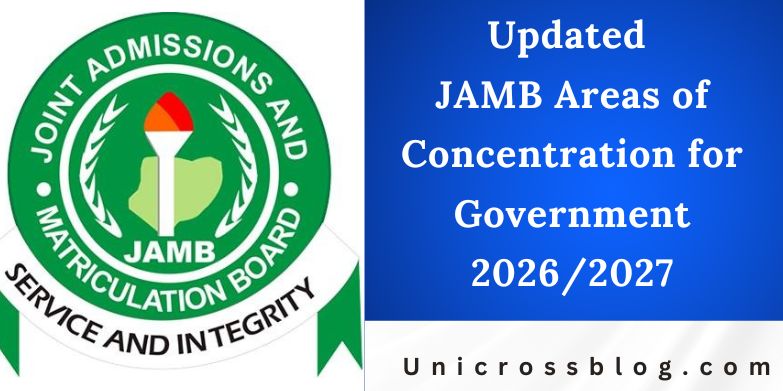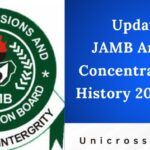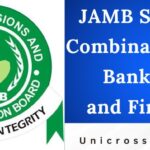The Joint Admissions and Matriculation Board (JAMB) conducts the Unified Tertiary Matriculation Examination (UTME) as a gateway for Nigerian students seeking admission into universities, polytechnics, and colleges of education. For the 2026/2027 academic session, the Government syllabus remains a cornerstone for candidates pursuing courses in Political Science, Law, International Relations, Public Administration, and related fields. Government as a subject tests candidates’ understanding of political systems, historical developments, and global interactions, emphasizing critical thinking and analytical skills.
The areas of concentration are derived from the official JAMB syllabus, which outlines key topics likely to feature prominently in the exam. These areas help candidates prioritize their study efforts, focusing on high-yield concepts rather than exhaustive coverage of unrelated materials. While the syllabus is updated periodically to reflect contemporary issues, the core structure for 2026/2027 mirrors previous years with minor emphases on current Nigerian political dynamics and international relations. Candidates should note that questions may include objective items on definitions, historical events, and theoretical applications, often drawn from these concentrated areas.
This guide provides a detailed breakdown of the updated areas of concentration, organized thematically for clarity. It is designed to be a concise yet comprehensive resource, enabling effective revision.

JAMB Areas of Concentration for Government
1. Elements of Government
This foundational section explores the basic principles and structures of governance, forming the bedrock for understanding political systems worldwide.
- Basic Concepts in Government: Define and differentiate key terms such as state, nation, society, government, sovereignty, and power. Explain the attributes of a state (population, territory, government, sovereignty) and the elements of power (influence, authority, legitimacy). Candidates should be able to discuss how these concepts apply to modern nation-states.
- Forms of Government: Identify and compare various systems including monarchy (absolute and constitutional), aristocracy, oligarchy, autocracy, republic, and democracy. Highlight merits and demerits, such as the stability of monarchy versus the accountability in democracy. Recent questions may reference hybrid systems like Nigeria’s presidential democracy.
- The Constitution: Analyze the nature, sources, and features of constitutions (written vs. unwritten, rigid vs. flexible). Discuss the importance of supremacy, amendment processes, and judicial review. Focus on case studies like the 1999 Nigerian Constitution and its federal structure.
- Separation of Powers: Describe the theory by Montesquiu and its application in preventing abuse of power. Explain the roles of the executive, legislature, and judiciary, with examples from the U.S. and Nigerian systems. Emphasize checks and balances, such as legislative oversight of executive actions.
- Rule of Law: Elucidate Dicey’s principles (equality before the law, presumption of innocence, and constitutional supremacy). Discuss limitations in practice, particularly in developing countries, and its role in safeguarding rights.
- Fundamental Principles of Democracy: Cover popular sovereignty, political equality, majority rule with minority rights, rule of law, and independent judiciary. Relate these to electoral systems (first-past-the-post vs. proportional representation) and their impact on representation.
- Political Ideologies: Outline liberalism (individual freedoms), socialism (collective welfare), communism (classless society), fascism (authoritarian nationalism), and feudalism (hierarchical land-based systems). Compare their economic and social implications, with relevance to Nigerian political debates.
2. Political Developments in Nigeria
This section traces Nigeria’s political evolution, highlighting pre-colonial, colonial, and post-independence milestones, crucial for contextualizing current governance challenges.
- Pre-Colonial Political Systems: Examine centralized systems (e.g., Hausa-Fulani emirates, Oyo Empire) and decentralized ones (e.g., Igbo village democracies, Tiv segmentary societies). Discuss leadership structures, justice systems, and economic bases like trade and agriculture.
- Colonial Era: Detail the amalgamation of 1914, indirect rule (Lugard), and the Richards, Macpherson, and Lyttleton constitutions. Analyze nationalist movements, key figures (Nnamdi Azikiwe, Obafemi Awolowo, Ahmadu Bello), and the path to independence in 1960.
- Post-Independence Developments: Cover the First Republic (1960-1966), military coups (1966, 1983), the Second Republic (1979-1983), and the Abacha regime. Focus on the 1999 transition to civilian rule and amendments to the 1999 Constitution.
- Public Corporations and Privatization: Explain the establishment, functions, and challenges of parastatals like NNPC and NIPOST. Discuss privatization policies under Babangida and Obasanjo, including successes (telecoms) and failures (power sector).
- Local Government Administration: Outline the 1976 local government reforms, functions (as per the Fourth Schedule of the 1999 Constitution), and funding sources (federal allocations, taxes). Address issues like autonomy and state interference.
- The Public Service: Describe the civil service structure, principles (neutrality, anonymity, tenure), and reforms (Udoji Commission, 1988 Civil Service Reorganization). Highlight recruitment, promotion, and challenges like corruption.
3. Foreign Policy and Nigeria’s Relationship with the International Community
Nigeria’s external relations are a recurring theme, testing knowledge of diplomacy, conflicts, and global positioning.
- Basic Principles of Foreign Policy: Identify non-alignment, Africa as the centerpiece, and peaceful coexistence. Explain determinants like national interest, geography, and economic needs.
- Nigeria’s Foreign Policy Objectives: Discuss promotion of African unity, decolonization, global peace, and economic diplomacy. Reference policies under Gowon (OAU focus) and Buhari (anti-apartheid stance).
- Nigeria’s Role in African Unity: Cover founding of the OAU (1963) and AU (2002), contributions to peacekeeping (ECOMOG in Liberia), and leadership in ECOWAS. Analyze challenges like border disputes and refugee crises.
- Nigeria and the Commonwealth: Explain membership benefits (technical aid, scholarships) and Nigeria’s suspension post-1995 coup, followed by reinstatement in 1999.
- Nigeria and the United Nations: Detail participation in peacekeeping (UNIFIL in Lebanon), contributions to UN budgets, and roles in decolonization committees. Focus on Millennium Development Goals and Sustainable Development Goals.
- Nigeria and the Wider World: Examine relations with the U.S. (oil trade, anti-terrorism), China (infrastructure loans), and the EU (trade partnerships). Discuss non-oil export diversification and diaspora remittances.
4. International Organizations
This area emphasizes global institutions and their impact on member states, with questions often on functions and reforms.
- Major International Organizations: Describe the UN (structure: General Assembly, Security Council), AU (peace and security mandate), ECOWAS (economic integration, free trade), OPEC (oil pricing), Commonwealth (democracy promotion), and WTO (trade rules).
- Reasons for Membership and Objectives: Highlight economic benefits (aid, markets), political (diplomacy), and security (collective defense). For ECOWAS, note the 1975 Treaty and ECOMOG interventions.
- Functions and Achievements: Cover UN’s human rights declarations, AU’s African Peer Review Mechanism, and OPEC’s quota systems. Discuss successes like smallpox eradication (WHO) and failures like Rwanda genocide prevention.
- Constraints on Membership: Address sovereignty erosion, financial burdens, and veto powers (UN Security Council). Reference Nigeria’s push for UNSC permanent seat.
Study Tips for Success
To excel, integrate past questions into your revision, as patterns repeat. Use mnemonics for lists (e.g., “P-T-G-S” for state attributes: Population, Territory, Government, Sovereignty). Form study groups to debate ideologies and policies. Allocate time: 40% to elements, 30% to Nigerian developments, 20% to foreign policy, 10% to organizations. Practice timed mocks to build speed, aiming for accuracy over guesswork.
By concentrating on these areas, candidates can navigate the exam confidently, turning potential pitfalls into scoring opportunities. Consistent effort in these focused topics will not only boost Government scores but also enhance overall UTME performance.
READ ALSO: Updated JAMB Areas of Concentration for Geography 2026/2027
FAQs
Has the JAMB Government syllabus changed significantly for 2026/2027?
No major overhauls; updates emphasize contemporary issues like digital governance and climate diplomacy, but core topics remain consistent.
How many questions come from each section in the Government exam?
Typically, 15-20 from Elements, 15-20 from Nigerian developments, 10 from foreign policy, and 5-10 from international organizations, though distribution varies.
Are past JAMB questions sufficient for preparation?
Yes, but supplement with textbooks like “Essential Government” by C.C. Dibie for deeper insights.
What if I miss a topic during revision?
Prioritize high-weight areas like forms of government and pre-colonial systems, which appear frequently.
Can I use online resources for Government prep?
Absolutely, but cross-verify with official JAMB materials to avoid outdated info.
How does Government scoring affect my overall UTME aggregate?
It contributes 25% to your total score; strong performance here can offset weaker subjects.







